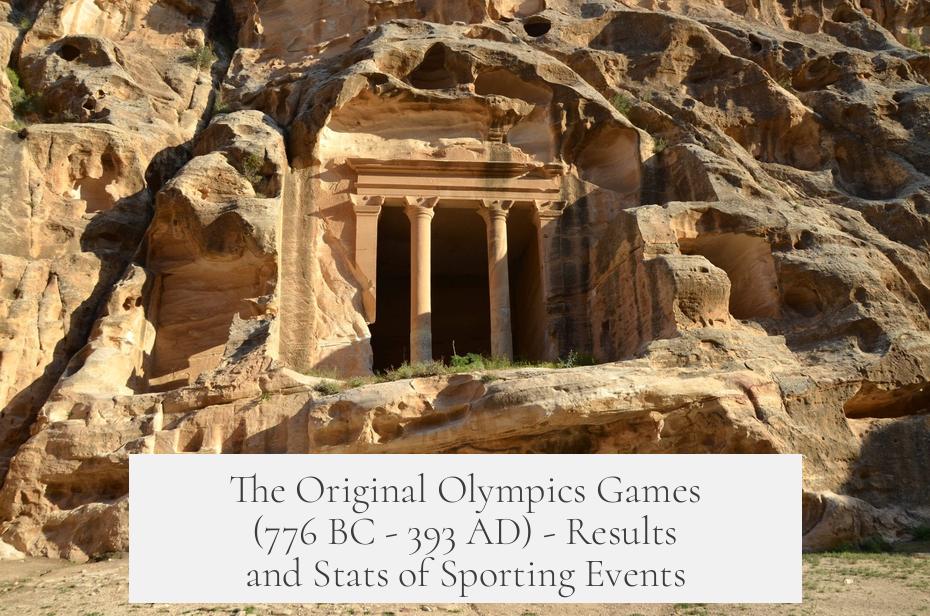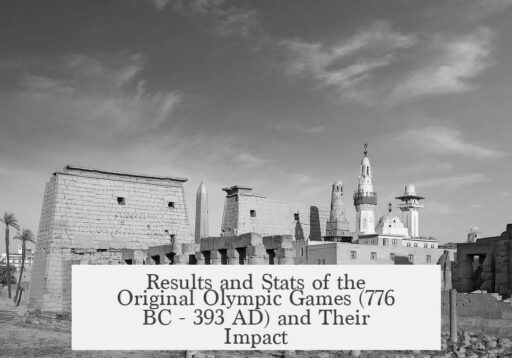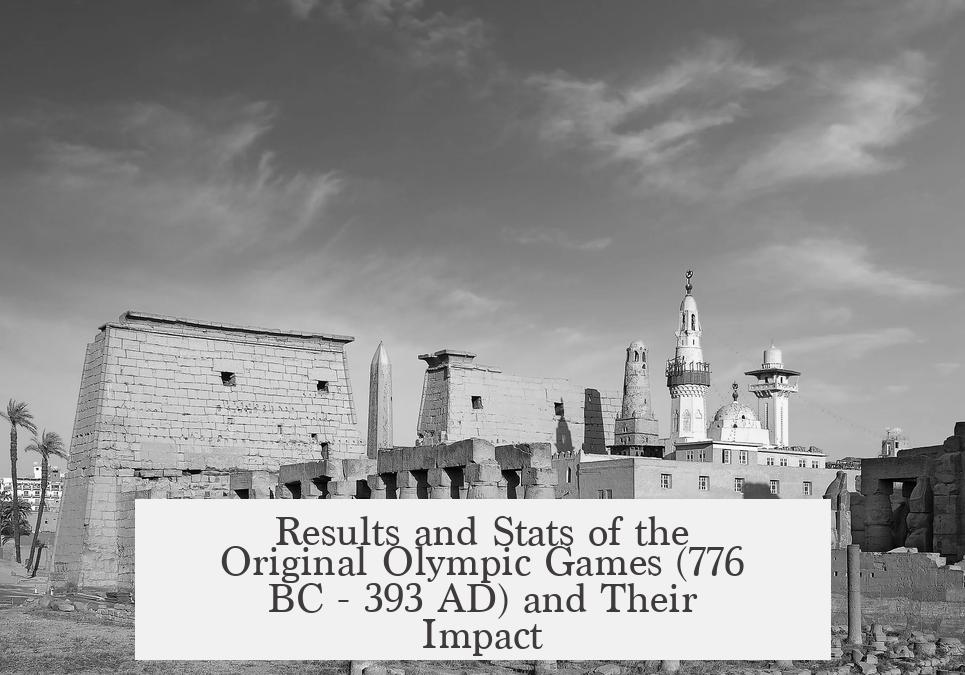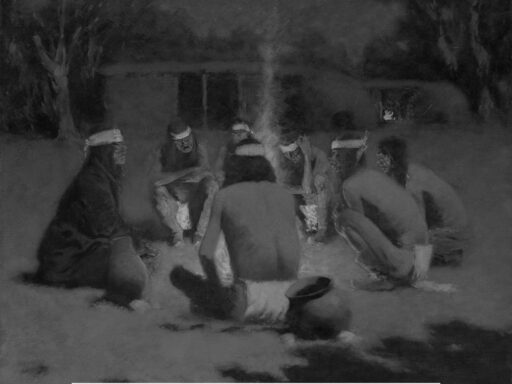The original Olympic Games, held from 776 BC to 393 AD, primarily recorded victors of the stadion race rather than winners of every sport. These records served as a shared chronological framework across Greece, but a complete, consistent list of all sporting event results does not survive.
The stadion race, a short foot race roughly 200 meters long, was the main event. Winning this race earned an athlete the title of Olympionikos (Olympic victor) and often represented the overall victor of the Games. The foot race held comparable prestige to today’s 100-meter dash, symbolizing supreme speed and athletic prowess. Occasionally, victors from other events were noted, but these records are inconsistent and fragmentary.
Lists of winners began with the Games’ acknowledged beginning in 776 BC, marked by Koroibos of Elis winning the stadion race. These lists originally appeared at Olympia but do not survive intact. What remains come from later historians such as Hippias in the 5th century BC and the Roman-era historian Eusebius of Caesarea. Eusebius compiled the most extensive surviving list, covering 249 Olympiads (almost 1000 years). Additional fragments come from papyri found in Oxyrhynchus, Egypt, and other classical authors.
These victor lists did not serve only as sports records. They were crucial to synchronizing time across the Greek world, where each city-state used its local calendar. The four-year Olympic cycle provided a shared chronological landmark. For example, cities like Athens linked their ruling archons’ years to Olympiad dates. Similarly, Sparta coordinated its ephorate years. This synchronization helped unify disparate Greek polities in historical record-keeping.
Despite their importance, the surviving victor lists are incomplete and sometimes contradictory. They focus mostly on the stadion race winner and rarely include a comprehensive roster of winners across all events, which ranged from running and wrestling to boxing, pankration, and equestrian contests. Some versions name victors in other sports, but no source fully captures each Olympics’ entire roster of winners. Differences among sources make reconstructing a single, authoritative list impossible.
Key sources for these lists include:
- Hippias of Elis – created early recorded victor lists around the 5th century BC.
- Eusebius of Caesarea – compiled a lengthy victor list used in later histories.
- Diodorus Siculus – offered Roman-era accounts.
- Papyri fragments – discovered in Egypt with partial data on Olympic victors.
Modern scholarship has analyzed these sources extensively. Paul Christesen’s work, Olympic Victor Lists and Ancient Greek History, provides detailed examination and translations. Alan Samuel’s Greek and Roman Chronology also offers helpful context. Online resources such as Wikipedia maintain updated lists drawn from these scholarly works but note their gaps and inconsistencies.
| Aspect | Details |
|---|---|
| Time frame | 776 BC to 393 AD (ancient Games) |
| Main event recorded | Stadion race winner (foot race) |
| Other events | Occasional mention, patchy records |
| Primary sources | Hippias, Eusebius, Diodorus, Oxyrhynchus papyri |
| Purpose of records | Synchronize Greek calendars via Olympiad cycle |
| Completeness | Partial and sometimes contradictory |
To understand results from the original Olympic Games, one must recognize their focus on the stadion race winner as the key victor. Lists served both sporting and chronological functions. No complete record of every competition’s victor exists. Historians piece together fragments while noting inconsistencies and gaps. This ambiguity is typical given the passage of centuries and the evolving nature of record-keeping in the ancient world.
Key takeaways:
- Original Olympic victor lists primarily record stadion race winners, around which the Games’ chronology centers.
- Complete victor lists for all events do not survive; data from other events is limited and inconsistent.
- Victor lists helped synchronize diverse Greek city-states’ calendars through the Olympiad system.
- Sources include early historians like Hippias and Eusebius, plus papyrus fragments from Egypt.
- Modern research compiles and analyzes available data but cannot reconstruct a full, consistent record.
The Original Olympics Games (776 BC – 393 AD) – Results and Stats of Sporting Events?

Curious about the original Olympic Games and who triumphed back in the day? The ancient Olympics, running from 776 BC to 393 AD, famously kept records but not quite like today’s medal tables. The starring results mostly spotlight one winner each Olympiad—the victors of the stadion race, a sprint roughly 200 meters long, the highlight event of the games. Let’s dive into how these results were recorded, their importance, and why reconstructing a complete list of all victors is more complicated than you might expect.
Who Got Noticed? The Olympionikai and the Race for Fame
Unlike the modern Olympics where every event’s winner gets a shout-out, the ancient Games focused their fame on a single champion. The “Olympionikai” were lists naming victors, but primarily just the overall champion, usually the fastest sprinter in the stadion race. Think of it as the original 100-meter dash, the blue-ribbon event.
This makes sense because the stadion winner was seen as the fastest person in the ancient Greek world during that Olympiad—essentially the gold standard in athletic prowess. Occasionally, lists mention victors of wrestling, boxing, or the pentathlon but less consistently.
The first recorded winner was Koroibos in 776 BC, placing the origin of these victor lists firmly in the early 8th century BC, supported by archaeological evidence rather than just myth or legend. Even though some myths pushed the start date back by centuries, 776 BC remains the accepted kickoff, thanks to later historians and supporting digs.
How Did They Keep Track? Lists at Olympia and Beyond
At Olympia itself, winners’ names were displayed for all visitors. Unfortunately, that original list didn’t survive the ages. What we rely on now are secondary compilations by various ancient writers. Hippias, a 5th-century BC scholar, was among the first to create a compiled victor list. Centuries later, Eusebius of Caesarea extended this list through 249 Olympiads. Other historians, including Diodorus Siculus and various papyrus fragments found at Oxyrhynchus in Egypt, add more puzzle pieces.
Still, no single source covers every single event or winner perfectly. Conflicts between different lists are common, and occasionally one source names a victor that another omits or disputes. So, while we have quite rich records for some events, a complete, detailed archive? Unfortunately, that’s lost to history.
Why Did the Greeks Care About Keeping These Lists?
Beyond bragging rights, these victor lists served a practical purpose: they standardized time across Greece. Each city used its own calendar and dating system, which could get confusing. Enter the Olympic Games: held every four years, they became a universal marker. People could say, “This happened in the 10th Olympiad,” and everyone across Greece understood the timeframe.
Greek cities like Athens and Sparta synchronized their local records by cross-referencing their rulers’ years (archons in Athens, ephors in Sparta) with the Olympic cycles. This was a clever way to keep national histories straight in a shared temporal framework.
What Can’t We Find Out? The Limits of Ancient Olympic Data

As intriguing as it is, the original Olympics didn’t deliver comprehensive stats like modern Games. No full listings of all events and winners survive. Some sources provide fragmented or partial results for different years or sports, but they often contradict each other.
This patchwork nature frustrates historians hoping to compile exhaustive results. We know some victors—especially stadion champions—and occasionally winners in boxing or wrestling. But the full roster from every Olympiad remains elusive.
Digging Deeper: Where to Learn More About Ancient Olympic Victors
If you’re itching to explore the ancient victor lists, several key sources shine a light on them:
- Paul Christesen’s works like Olympic Victor Lists and Ancient Greek History (Cambridge, 2007) give detailed analysis and Greek text of Eusebius’ lists.
- Historical reconstructions and translations appear in Traditio (2006), especially a paper by Christesen and Martirosova-Torlone.
- Alan Samuel’s Greek and Roman Chronology (1972) compiles key timelines relevant to Olympic dating.
- Wikipedia’s List of Ancient Olympic Victors provides a handy gateway with references.
Unfortunately, some online databases like the Foundation for the Hellenic World’s Olympic victor database aren’t currently accessible, but they once offered detailed insights.
So, What’s the Takeaway from These Ancient Records?
In summary, the original Olympics focused on celebrating the fastest and strongest athletes, with the stadion race supreme among them. The victors’ names served a dual purpose: honoring glory and providing a shared chronological backbone for the Greek world.
Yet, neat and tidy record books? Not quite. Many lists exist, but none capture every event or winner consistently. Their true legacy lies more in cultural unity than in complete sports statistics.
Isn’t it fascinating that 2,700 years ago, a sports event could hold all Greece together in time, helping them mark history just like we mark seasons today? Next time you watch a sprint final, remember Koroibos and the ancient racers sprinting toward immortality—recorded not in flashy data sets, but in the shared memory that still runs through modern Olympics.




